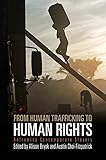From Human Trafficking to Human Rights : Reframing Contemporary Slavery / ed. by Alison Brysk, Austin Choi-Fitzpatrick.
Material type: TextSeries: Pennsylvania Studies in Human RightsPublisher: Philadelphia : University of Pennsylvania Press, [2012]Copyright date: ©2012Description: 1 online resource (280 p.) : 2 illusContent type:
TextSeries: Pennsylvania Studies in Human RightsPublisher: Philadelphia : University of Pennsylvania Press, [2012]Copyright date: ©2012Description: 1 online resource (280 p.) : 2 illusContent type: - 9780812243826
- 9780812205732
- 306.362
- online - DeGruyter
- Issued also in print.
| Item type | Current library | Call number | URL | Status | Notes | Barcode | |
|---|---|---|---|---|---|---|---|
 eBook
eBook
|
Biblioteca "Angelicum" Pont. Univ. S.Tommaso d'Aquino Nuvola online | online - DeGruyter (Browse shelf(Opens below)) | Online access | Not for loan (Accesso limitato) | Accesso per gli utenti autorizzati / Access for authorized users | (dgr)9780812205732 |
Frontmatter -- Contents -- Introduction. Rethinking Traffi cking -- PART I. From Sex to Slavery -- Chapter 1. Rethinking Traffi cking: Contemporary Slavery -- Chapter 2. Uncomfortable Silences: Contemporary Slavery and the "Lessons" of History -- Chapter 3. Representing Traffi cking: Media in the United States, Great Britain, and Canada -- PART II. From Prostitution to Power -- Chapter 4. Rethinking Traffi cking: Human Rights and Private Wrongs -- Chapter 5. The Sexual Politics of U.S. Inter/National Security -- Chapter 6. Rethinking Gender Violence: Battered and Trafficked Women in Greece and the United States -- Chapter 7. Peacekeepers and Human Trafficking: The New Security Dilemma -- Chapter 8. The Good, the Bad, and the Ugly: Assessing the Impact of the OAS and the UN on Human Trafficking in Haiti -- PART III. FROM RESCUE TO RIGHTS -- Chapter 9. Making Human Rights Accessible: The Role of Governments in Trafficking and Migrant Labor Exploitation -- Chapter 10. Human Rights and Human Trafficking: A Reflection on the Influence and Evolution of the U.S. Trafficking in Persons Reports -- Chapter 11. The Anti- slavery Movement: Making Rights Reality -- Notes -- Bibliography -- List of Contributors -- Index -- Acknowledgments
restricted access online access with authorization star
http://purl.org/coar/access_right/c_16ec
Over the last decade, public, political, and scholarly attention has focused on human trafficking and contemporary forms of slavery. Yet as human rights scholars Alison Brysk and Austin Choi-Fitzpatrick argue, most current work tends to be more descriptive and focused on trafficking for sexual exploitation.In From Human Trafficking to Human Rights, Brysk, Choi-Fitzpatrick, and a cast of experts demonstrate that it is time to recognize human trafficking as more a matter of human rights and social justice, rooted in larger structural issues relating to the global economy, human security, U.S. foreign policy, and labor and gender relations. Such reframing involves overcoming several of the most difficult barriers to the development of human rights discourse: women's rights as human rights, labor rights as a confluence of structure and agency, the interdependence of migration and discrimination, the ideological and policy hegemony of the United States in setting the terms of debate, and a politics of global justice and governance.Throughout this volume, the argument is clear: a deep human rights approach can improve analysis and response by recovering human rights principles that match protection with empowerment and recognize the interdependence of social rights and personal freedoms. Together, contributors to the volume conclude that rethinking trafficking requires moving our orientation from sex to slavery, from prostitution to power relations, and from rescue to rights. On the basis of this argument, From Human Trafficking to Human Rights offers concrete policy approaches to improve the global response necessary to end slavery responsibly.
Issued also in print.
Mode of access: Internet via World Wide Web.
In English.
Description based on online resource; title from PDF title page (publisher's Web site, viewed 24. Apr 2022)


